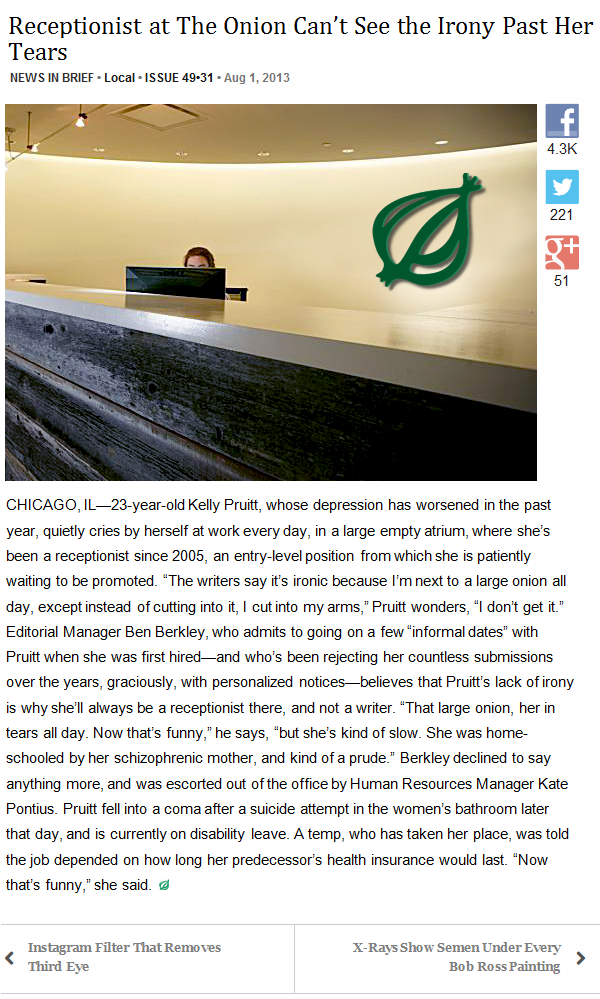Home Alone

What if Macaulay Culkin’s parents never came home after Christmas and the movie just ended. What if his Munchian “scream” stayed glued that way, in some German expressionist hell. The aftershave wore off, his soft cheeks speckled with facial hair growth as testosterone came, the perceived alienation of adolescence followed by the real one—of traffic jams, grocery store lines, and distracted doctors who don’t look you in the eye—of adulthood, our walking parody of actualized nightmares. Every week or so, new burglars (subconsciously, pedophiles) would try to break in, and Kevin’s contraptions of evasion would become more and more sophisticated, personal and sadistic, until they resembled the death machines in Saw. In rare footage of Jeffrey Dahmer being filmed during Christmas by his father in the living room next to a tree, ridden with then technology’s VCR static, he leans away with such repulsion—for whom, one wonders—that you mistake him for a vanishing point, like some Renaissance man finally understanding depth perception. After the bodies and/or their parts were discovered in Dahmer’s apartment, they tore down the famous-yet-unrentable building, leaving all the residents at the whim of city housing. Jeffrey’s neighbor and former friend, a big black Baptisty woman, recalled having her “sanity pushed to the limit” having eaten sandwiches at his home. “I have probably eaten someone’s body part,” she says, addressing the camera in eerie second person, “how dare you do this to me?”
I Hope You Feel Better

Studies have shown that the internet makes people feel bad. That these studies are almost always read online would make, you would think, one feel better. But the internet—where delusion and projection join hands in violent democracy—is also a reprieve from the horrible real world. It’s a viscous cycle. As an idle masochist, I often visit Dwell to “keep up” with all the confidently sparse modernist homes lived in by well-adjusted designer type-A people. Europeans, vegetarians, zombies of good fortune. We assume the owners are at a party, symphony, gala, or fundraising, letting light fall upon their absence in the quiet glory of their restrained taste. I also habitually visit J. Crew, at times to browse the Mens’ section for items that won’t make me taller, but mainly to check out all the beautiful women I have no chance dating. The Abercrombie & Fitch girls seem inbred, and the Prada models look anemic, ridden with some disease. J. Crew does a great job at consolidating the yuppie, bougie, slightly artsy and bohemian looks very well, with a touch of polite hipster, into the perfect interesting-but-not-crazy woman. They are dream girlfriends. I’m talking a handjob at a Philip Glass concert. I’m talking photoshop.
Mistakes Friends Made
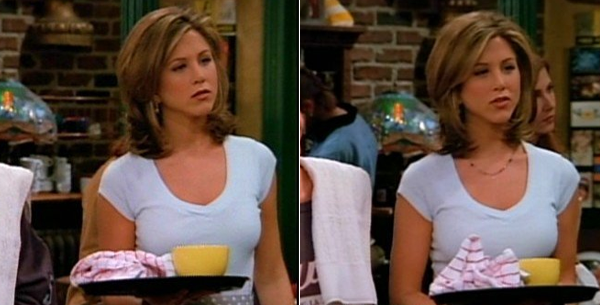
In the second season of Friends, Rachel—in what could be construed by the spiritual as divine intervention—is seen, between takes, suddenly wearing a necklace. The famous episode concerns Ross, whose budding relationship with another woman (they recently acquired a cat) summons dormant feelings in the waitress, whose real life actress, Jennifer Aniston, is to go on—through divorce and a kind of, in my mind, nobly unmarketed depression—to embody the developing cougar. They kiss for the first time in this episode, the laugh track giggles supplemented by oohs and awws. In this modern Romeo & Juliet, a “conceited tragedie” according to the 1597 first edition title page, the two rivaling families are replaced by the likewise quarrelsome rent vs. romance. Rachel’s spontaneous, perhaps wishful, necklace is captured by Movie Mistakes, a website featuring stills of logical inconsistencies in popular television and film. While these may all be simply attributed to overworked P.A.s occasionally letting logic slip by, each incident has spiritual gist, if by “spiritual” we mean the irrational answer to irrational quandaries: the sudden appearance of an object, or feeling.
Great Here
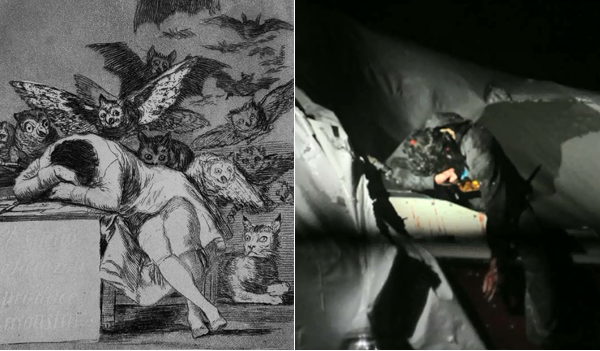
In reaction to Dzhokhar Tsarnaev beautifully gracing the cover of Rolling Stone, with great hair the less-disheveled would pay for, a Massachusetts State Police officer released photos of “the real Boston bomber,” as a kind of ultimate #nofilter, featuring one of the boy painfully climbing out of the boat he was hiding in. A sniper’s rifle laser falls short of the Hindu third-eye, but we’ll take that red dot as a kind of more precise Western spirituality. Francisco Goya’s “The Sleep of Reason Produces Monsters” (c. 1798) is probably the most iconic of Los Caprichos, a set of 80 satirical etchings condemning Spanish society for its superstitious pedagogy and foolish ruling class. “The author is dreaming,” he remarks of the print. “His only intention is to banish harmful superstition and to perpetuate with this work of fancy the sound testimony of Truth.” Little did he know that we, as idle linguists with something to grind, would chew on such Truth like termites over the course of a ruined home. The author ducks from his very thoughts, portrayed by flocking owls, only to be banished within the very consciousness from which such birds are cracked. It’s not great here, the mind. In 1970, Charles Manson was featured on the cover the Rolling Stone — with likewise great hair, which may also invoke Jimi Hendrix, Britney Spears, George Harrison, Kurt Cobain, Justin Bieber, Johnny Depp, Amy Winehouse, Madonna, et al., etc., ad infin. Short of reducing such talented people to their hair, we might consider whose demand the magazine is supplicating. As part of the American dream i.e. code for commerce, appalled dissenters are free to not buy a copy, and stores — in timid solidarity with its ruling class, the consumers — may boycott that issue, or the magazine in general. My guess is they’ll be fine. Two wrongs don’t make a right, but a market return. In our grand national narcolepsy, may we have a lucid dream in which we wake, one so lifelike and real — with bells and whistles, traffic jams and hail, love and murder — that it seems, with insane conviction chaperoned by invented beasts, that we are awake.
Sculpture Garden
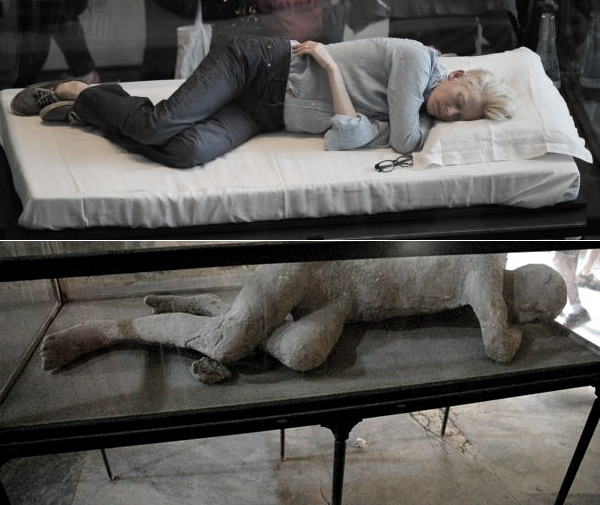
History repeats itself, first as tragedy, second as farce.
– Karl Marx
My parents are on their annual cruise, this time the Mediterranean. They disembark from Nice France, making their way to Naples Italy, then Greece. “They’ll probably have you visit Pompeii,” I said to my mom. “What’s that?” she said, stuffing $40 dollars worth of fruit into a juicer. “Where an entire city got buried in ash, thanks,” I said with a new smoothie in hand. In about two weeks, when they come back, my mom will call me on the phone (while I’m at work) with an exhausting account — she’s been known to take notes — of all of my dad’s cultural, personal, and moral transgressions. “Sure,” I’ll say, in response to accompanying her — who vowed, again, never to step on a ship with my dad, ever again — next year to the cruise. I’ll internally dread going, as I dread most things on the horizon, where I imagine burning bodies and a cable bill. This is my life.
Which Trial?
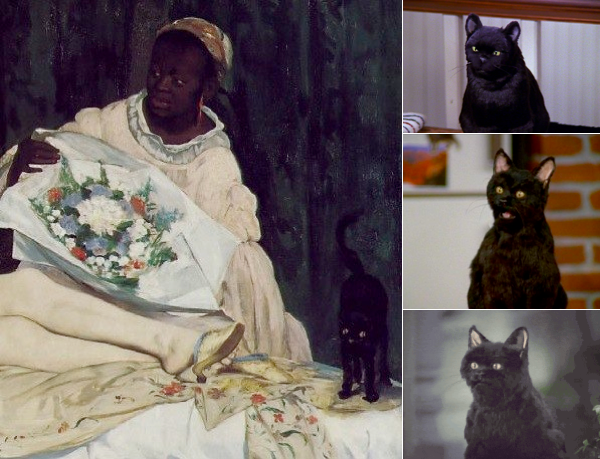
As our eyes get sucked into the flat vortex of Olympia’s pale skin (Olympia. Manet, 1863), we miss the black cat, visually camouflaged in the same manner as the black maid. The cat holds the threatened pose of an arched back, perhaps terrified at the prospect of being immortalized in this human game of representation. In a now timeless interview at a New York Times TimesTalks event, Paula Deen — in that weird Southern defensive and ultimately counteractive way — feels compelled to express solidarity with black folk by casually calling up a black employee, one Hollis Johnson, whose skin she warned was “as black as this board,” referring to the backdrop behind her. “We can’t see you standing in front of that dark board!” she says, which made me, of all people, behind my laptop, feel humiliated. My sensibilities (privileged, protected) were simply shocked. The audience awkwardly laughs, knowing in their bones that just ain’t right, but this was before her public lynching (irony lives on). I’ve never liked Paula Deen; the affected Southern drawl, entitled casualness with everything around her, and earplugs politics all make for a kind of confederate hubris at war with liberal America, which is exactly the demographic (out-of-touch obese Republicans) Food Network was aiming at; and while it remains so predictable, and hypocritical, that they quickly snip her corrupted legacy from their corporate brand, it was invariably the only thing they could do. Instead of using this sad time to talk about racism (if it is even that, or merely glib provincialism), the academics and media have safely mollified discourse by shutting it down, branding her a “racist,” a conversation ending zinger whose ring feels attuned to McCarthy’s “communist,” Bush’s “terrorist,” and the Neo-Conservative “socialist,” words so bloated with ideological complexity they are rendered cacophonous.
Crying Woolf
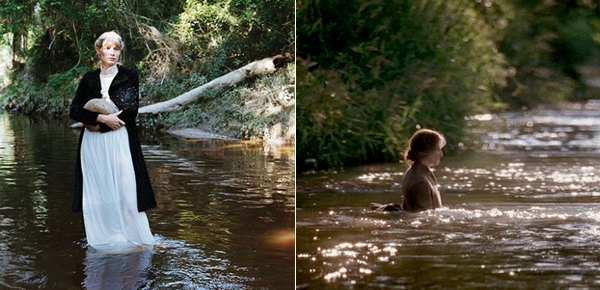
On October 26, 1984, nineteen-year-old John McCollum committed suicide by shooting himself in the head while listening to “Suicide Solution” by Ozzy Osbourne. The former’s parents would later file a lawsuit against the latter, claiming there were “hidden lyrics” telling listeners to shoot themselves. At two minutes into it, between verses, Ozzy does sort of mumble away from the mic what sounds like “soot, soot…haha,” which wife/witness Sharon attributed to her husband’s “minimal” command of the English language. The opening lines wine is fine but whiskey’s quicker / suicide is slow with liquor seem to borrow both cadence and conceit from Dorothy Parker’s “Resumé¹,” in which she offers life as a disappointing alternative to rather uncomfortable death options. Likewise, Ozzy’s lyrics also end in an anti-suicide predictably pro-inebriation stance: take a bottle, drown your sorrows / then it floods away tomorrows. The court dismissed the McCollum lawsuit, ruling that their son’s suicide was just that. His parents wanted someone to blame, because they couldn’t bear blaming themselves. God is the one scapegoat who never talks back, so in the end we all hold him liable, and finally quiet down.
Love of God
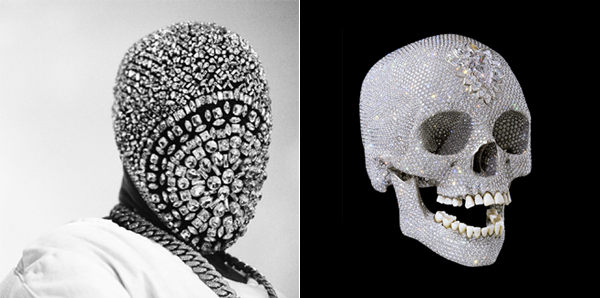
Kanye West, in keeping with a truncated periphery necessary for megalomania, has upgraded from hipster shutter shades to a high couture diamond mask (by Belgian fashion designer Maison Martin Margiela) whose stones, growing in carat, funnel into his money machine, that is, mouth. His favorite puns involve you swallowing his cum, which is why I prefer to listen to him with a can of ginger ale handy. Like cheesy pop songs of the mid-90s with that embarrassing rap interlude, today’s hip hop (Kanye, Drake, Frank Ocean) strains itself with melody, often auto-tuned. As Yeezus is released today, drying out all the fervent leaks a week prior, we’ve found — or perhaps created — a black Jesus whose relation to our sins seems less compassionate than complicit. Short of dying for our sins, he would rather watch. The sadness of the “real” Jesus story is that he was gracefully on our side, which seemed too good to be true, so we killed him. It is the story of a learned cynicism, our grand expulsion. In 1966, John Lennon said The Beatles were more popular than Jesus and was met with outrage from both the Christian right and populace. Lennon later explained he was referring to the decline of religion (though his Jesus complex eventually resurfaced with his Abbey Road white suit and Imagine white piano). Damien Hirst’s For the Love of God (2007) is a sculpture about economics. It cost £14,000,000 to produce and was exhibited at an asking price of £50,000,000, an instant 350% inflation for patrons perhaps too dense to see the sarcasm. Hirst has been obsessed with a Dahmer-esque clinical curiosity of what’s inside us, though his perverse pathos stops short at a grant. His work mocks the mortal’s concept of immortality. Self-aware to a degree, Kanye’s diamond mask probably has little to do with the diamond mining industry in Africa, which accounts for two-thirds of the world’s diamonds, and whose upsetting trade empowers warlords and insurgents. If there’s any thing to say, we are enamored with the spectacle of depth. The stage as a pulpit. Grandiose entitlement is rather American, and with that, Kanye stops being its critic. Tired of splooge allusions, his “I am a God” repeats the title over and over: I am a God / Hurry up with my damn massage, though each time I read that line I see “message,” perhaps delusional that there is one.

